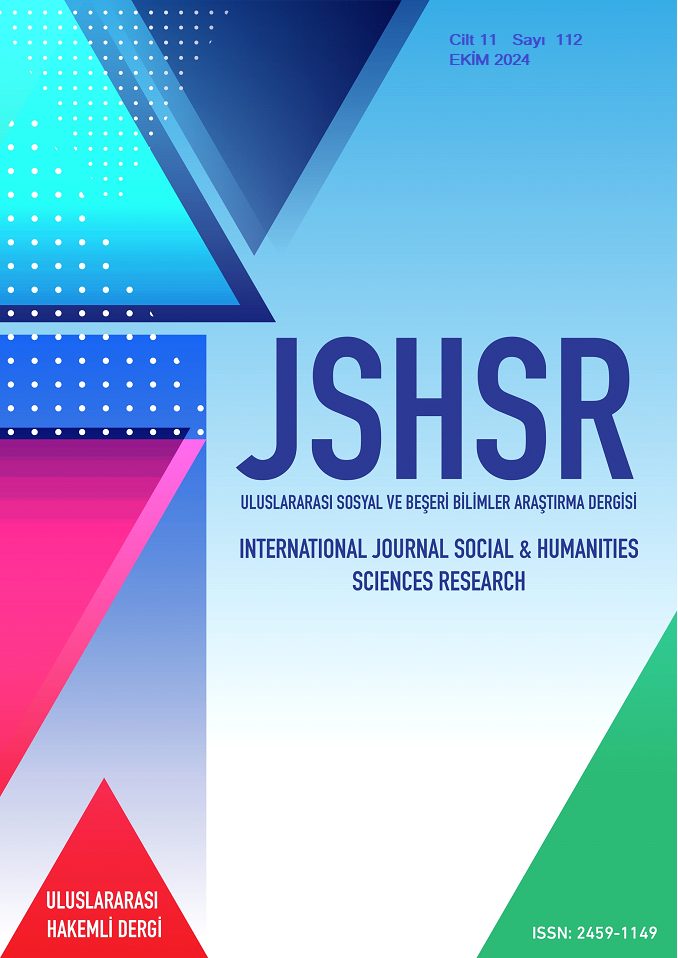Investigation Of the Relationship Between Organizational Cronism and Organizational Resilience in Logistics Employees
DOI:
https://doi.org/10.5281/zenodo.14045214Keywords:
Organizational Cronyism, Favoritism, Organizational ResilienceAbstract
The purpose of this study is to determine the effects of organizational cronyism on organizational resilience. Within the scope of the research, the relevant literature was thoroughly reviewed, and the current knowledge and theoretical approaches regarding the concepts of organizational cronyism and organizational resilience were presented. A theoretical framework was established in the literature based on the relationships and impacts between these two concepts. In the empirical part of the research, data was collected via a survey from participants working in logistics companies operating in the Kocaeli province. The research results revealed that organizational cronyism has a significant and negative effect on organizational resilience. Specifically, it was found that the dimensions of organizational cronyism, such as paternal (benevolent) cronyism, mutual-interest-based cronyism, and in-group bias, negatively impact the cognitive, behavioral, and contextual elements of organizational resilience. In conclusion, this study provides important findings suggesting that organizational cronyism weakens the resilience capabilities of organizations and contributes to ongoing discussions in the literature. It emphasizes that organizations should adopt a management approach based on justice and merit, minimizing cronyism, in order to sustain their long-term success.
References
Akgün, A. E., & Keskin, H. (2014). Organisational resilience capacity and firm product innovativeness and performance. International Journal of Production Research, 52(23), 6918-6937.
Aktan, C. C. (2001). Siyasal Ahlak ve Siyasal Yozlaşma. Yolsuzlukla Mücadele Stratejileri. (Edt: C. C. Aktan). 51-69. Hak-İş Yayınları
Arıcan, O.H., Ünal, A.U. (2023). The Effect of Working Conditions of Sefarers Working in Internal Waters on Work Performance as a Result of Leading the Work. International Journal of Social and Humanities Sciences (IJSHS), 7(2), 133-162
B.G. Tabachnick, L.S. Fidell (2013) Using Multivariate Statistics (sixth ed.) Pearson, Boston
Büyüköztürk, Ş. (2004). Sosyal Bilimler için Veri Analizi El Kitabı. Pegem A Yayıncılık.
Çetin, M., Yıldırım, A., & Şahin, Y. (2021). The Effects of Cronyism on Job Satisfaction and Intention to Quit the Job in Hotel Enterprises: The Case Of Three, Four And Five Star Hotels in Muğla, Turkey. International Journal of Hospitality Management, 96, 102915.
Çevik Tekin, İ., (2020) Kronizm (Eş-Dost, Tanıdık Kayırmacılığı). İş Hayatında Örgüt Düşmanı Davranışlar, (76-85) Konya, Eğitim Yayınevi, 1. Basım.
Çolak, Ö., & Uğurlu, M. (2020). Effects of Nepotism on Nursing Staff Job Satisfaction, Organizational Commitment and Intention to Quit. Journal of Nursing Management, 28(6), 1237-1245.
Eryılmaz, B. (2002), Kamu Yönetimi. Erkam Matbaacılık
Escriba-Esteve, A., Sanchez-Peinado, L. ve Sanchez-Peinado, E. (2009). The influence of top management teams in the strategic orientation and performance of small and mediumsized enterprises. British Journal of Management, 20(4), 581-597.
Gerçek, M. ve Yılmaz Börekçi, D. (2019). “Resilience” kavramına örgüt bağlamında türkçe karşılık önerileri. Ç.Ü. Sosyal Bilimler Enstitüsü Dergisi, 28 (2), 198-213.
Horne, John F., Orr, John E. (1998). Assessing Behaviors That Create Resilient Organizations. Employment Relations Today. 24: 29-39.
Kara, A. (2019). Çalışanlarda kayırmacılık algısının örgütsel bağlılığa etkisi (Yüksek Lisans Tezi), Necmettin Erbakan Üniversitesi Sosyal Bilimleri Enstitüsü.
Kayabaşı, Y. (2005). Politik Yozlaşmaya Çözüm Olarak Anayasal İktisat. (Yüksek Lisans Tezi). Çukurova Üniversitesi Sosyal Bilimler Enstitüsü.
Khan, A. U., Khan, R. A., & Shafique, I. (2020). The outcomes of organizational cronyism: A social exchange theory perspective. Journal of Managerial Sciences, 14(2), 128-142.
Khatri, N., & Tsang, E. W. K. (2003). Antecedents and consequences of cronyism in organizations. Journal of Business Ethics. 43, 289-303.
Khatri, N., Wen, C. Y., Fuei, L. W., & Geok, T. A. (2008). Cronyism: Antecedents and consequ-ences, Retrieved February,10
Lengnick-Hall,Cynthia A., Beck , Tammy E., Lengnick-Hall , Mark L. (2011), Developing a capacity for organizational resilience through strategic human resource management. Human Resource Management Review. s.21:243-255.
Mallak, L. (1998), Putting Organizational Resilience to Work. Industrial Management. 40(6), 8–13.
Milo, E., & Gashi, A. (2020). Nepotism, favoritism and cronyism and their effects on organizational trust and commitment: The case of the service sector in Albania. Management Science Letters, 10(12), 2725-2734.
Özdemir, S., Sönmez, S., & Bayram, İ. (2021). Nepotism, Favoritism and Cronyism: A study of their effects on job stress and job satisfaction in the banking industry of North Cyprus. International Journal of Organizational Leadership, 10(2), 165-176.
Özer, N. ve Çağlayan, ZA (2016). Öğretmenlerin müdürlerine duydukları güven ve kronizm algıları arasındaki ilişki. İnönü Üniversitesi Eğitim Bilimleri Enstitüsü Dergisi, 3 (5), 16-27.
Özkanan, A. & Erdem, R. (2014). Yönetimde kayırmacı uygulamalar: Kavramsal bir çerçeve. Süleyman Demirel Üniversitesi Sosyal Bilimler Enstitüsü Dergisi, 20
Polat, R. (2013). Ortaöğretim kurumlarında kronizm algısının örgütsel güven üzerindeki etkisi /The effect of perception of cronyism on organizational trust in secondary schools.
Rehman, M. U., & Shams, M. (2020). Linking organizational cronyism to deviant workplace behavior: Testing the mediating role of employee negligence in Pakistani higher education institutions. Higher Education, 80(6), 1131-1154.
Turhan, M. (2014). Organizational cronyism: A scale development and validation from the perspective of teachers. Journal of Business Ethics. 123.
Yan, Y., & Bei, H. (2009). The antecedents of organizational cronyism. Management and Service Science. MASS’09 International Conference 20-22 September
Yorulmaz, H. (2023). Dijital çağda KOBİ’lerde örgütsel dayanıklılık için stratejik yönelimler ve esnek çalışma model önerisi [Unpublished Doctoral dissertation]. Istanbul Medipol University.
Downloads
Published
How to Cite
Issue
Section
License
Copyright (c) 2024 INTERNATIONAL JOURNAL OF SOCIAL HUMANITIES SCIENCES RESEARCH

This work is licensed under a Creative Commons Attribution 4.0 International License.


